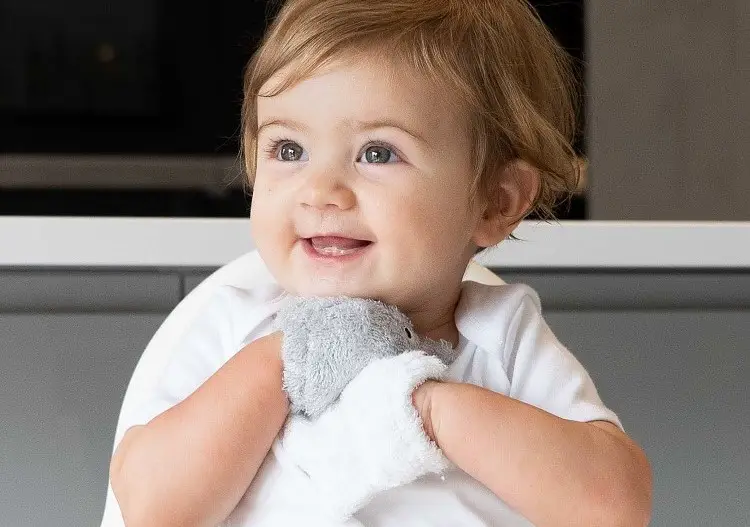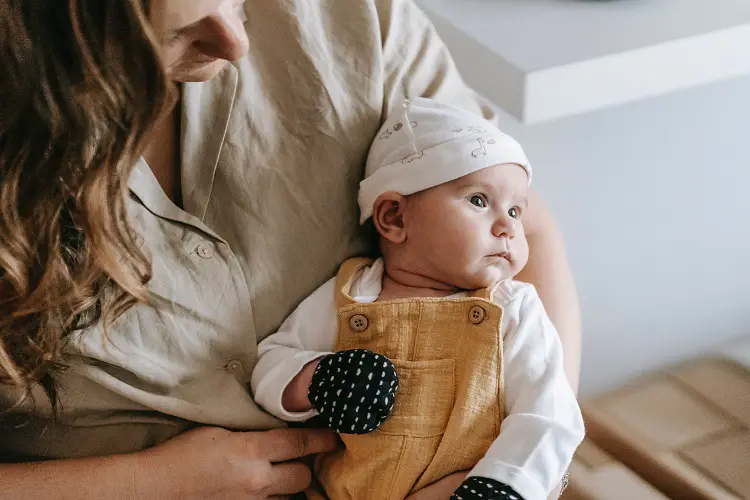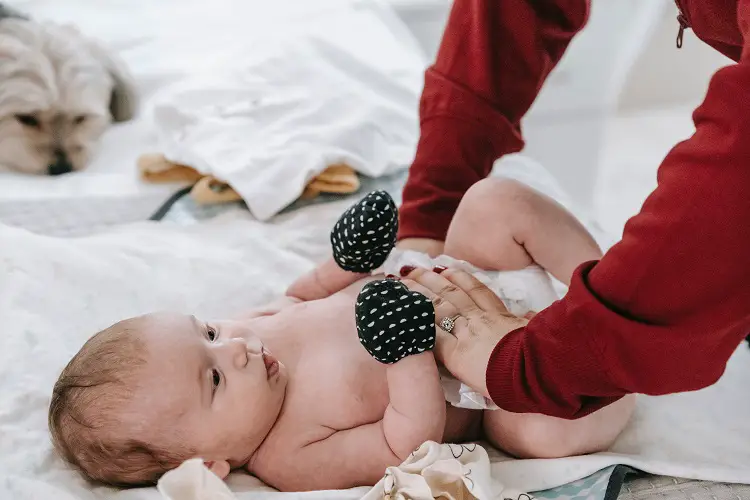Mittens are one of the essential little pieces of clothing’s that you’d always find in your baby’s clothes pack. When a child is born, parents would take a lot of good measures to ensure that the child is well cared for.
You know, babies are very delicate. This is the reason why they require a lot of care. This brings us to these simple questions…why do babies wear mittens, and how long should babies wear mittens.
Why Do Babies Wear Mittens?
Babies wear mittens for a couple of reasons. We’ll talk about the major two.
1. Protection
Babies are known to have very sharp fingernails. Also, babies are very active at the earliest stages of their lives. That is the stage where they try to adapt to a new environment that is entirely different from the womb that they have always known.
A good number of babies scratch their faces and bodies inadvertently with their hands. When babies wear mittens, this scratching would end. Apart from scratches, babies could also harm themselves if they are not worn mittens.
For example, a very active child could get an eye irritation by putting its fingers in its eyes. Mittens may look insignificant, but they are not at all. They play great roles in a baby’s protection.
2. Tame Bad Habits
Babies also wear mittens to help them discontinue bad habits. Babies pick some habits like sucking on their fingers, always putting hands inside their mouths, and every other thing.
These behaviors could fade out quickly with time as the child grows. But some may not fade out. It is not uncommon to find already grown children suck on their fingers much longer into their formative years.
Wearing babies’ mittens would discourage them from these habits because they won’t find it easy putting their hands in their mouths.
Read Also: How To Cut Newborn Baby Nails
How Long Should Babies Wear Mittens?

How long should babies wear mittens? This is one question that is very prevalent among parents, especially for first-time parents.
Mittens play some great roles in the first few weeks of a baby’s life. But when a baby wears mittens for too long, it could hinder the proper development of the baby.
Before we go on about how long babies should wear mittens, let’s first weigh the pros and cons of babies wearing a mitten.
The Pros and Cons of Babies Wearing Mitten
The Pros:
1. Warmth
Babies catch a cold easily. Wearing them mittens would keep them warm and healthier. Mittens come in different fabrics and styles. Be selective when picking mittens for your baby. Make sure to choose a pair that your baby would be comfortable in.
2. Hygiene
Wearing mittens would keep your baby very much hygienic and healthy. This is because your baby wouldn’t have to make direct contact with everything around it.
You must be very deliberate in washing your baby’s mittens too. When they become dirty, they pose a danger to your baby’s health.
3. One size fits all
One of the good things about mittens is that it fits all kind of sizes. This unique feature allows your baby to wear them for as long as they need it, even when the baby has grown a bit.
4. Makes breastfeeding easy
Babies usually like squeezing their mom’s breasts each time they are breastfeeding, and this can be quite painful as a mom. Wearing your baby mittens can help prevent this feeling, making you more comfortable each time you’re breastfeeding.
5. Prevents babies from scratching themselves
Babies with sharp nails can scratch themselves, leaving marks or wounds on their faces and skin. And since babies’ skin is sensitive, this can be dangerous because the baby might scratch his or her wounds which might then get infected.
How long should babies wear mittens? When you can just cut their nails each time it grows, you can retire your baby’s mittens.
6. Avoid thumb sucking
Using mittens can help prevent your baby from thumb-sucking because the mittens’ material is not comfortable to nibble on.
The Cons:
1. Choking
Babies are known to put their hands in their mouths at any given opportunity. Wearing mittens would endanger them in this regard. How is this possible? They could choke on the mitten and get serious health challenges under poor guidance.
2. Blood flow constriction
Mittens usually have elastic bands which hold them firmly to a baby’s hands. Some of these elastics could be so tight that they could constrict the baby’s blood flow around that region. This might not be easy to identify because babies are not grown enough to tell you how they feel.
3. Hygiene
Just as hygiene is among the pros of babies wearing mittens, it also has a disadvantage. Some babies wear mittens to discourage them from sucking on their fingers.
But sadly, the mittens might not even discourage them at all. Some babies still suck on their fingers despite the presence of the mittens.
In this case, the baby is exposed to a lot of germs because not only does the baby put the mitten into its mouth, it also brings it in contact with every other thing.
4. Discomfort and Frustration
The more a baby grows, the more uncomfortable a mitten becomes. This is because the baby would want to explore its surroundings with its bare hands.
A mitten makes this a very difficult thing to do. Frustration can set in too. Remember sometimes your baby cries for no explainable reason? It could be the discomfort caused by a fancy mitten.
Having weighed the pros and cons of babies’ wearing mittens, we are back to the original question.
How Long Should Babies Wear Mitten?
The truth is, there is no formula anywhere that explains how long babies should wear mittens.
Some parents decide when to stop their babies from wearing mittens. Others follow whatever guide they find anywhere, while others wait until mittens become a huge discomfort to the baby.
Child care experts say the ideal time for babies to stop wearing mittens is around when they are a month old or even less.
You might wonder, isn’t that too early? No, it isn’t. Your baby needs to develop its motor skills and get conversant with its environment by exploring try its hands.
As simple as a mitten may be, it could hinder the proper development of your baby when it is worn for too long. There’s no need to fret about other things.
The proper development of your baby comes first above every other thing. If you feel a month is too early for your baby to stop wearing mitten, you could consult with the people who have all the answers to child care questions.
A pediatrician will educate you on what you must know. He or she will certainly help you make a good decision concerning your child.
Read Also: How To Stop Baby From Pulling and Eating their Hair
How To Choose The Right Mittens?

Choosing the right mittens for your baby are also similar to choosing the right clothes for your baby. There are a lot of designs and colors available online that you can pick from to match their outfit.
And since there is a huge chance that they will get dirty when your baby is wearing them, it is a good idea to have a lot of them. Here are two important factors when choosing the right mitten for your baby.
- Fabric– Cotton is a well-known type of fabric for baby clothes. Most mittens are made of cotton, while some are made from bamboo fibers. Whatever fabric the mitten is made of, you must make sure that it is safe for your baby to use. You can purchase hypoallergenic mittens so that your baby can use them with 100% confidence that they won’t develop any allergic reactions.
- Type of fabric holding– This may depend on your choice and how your baby often moves and uses his hands. You can either go for the ribbon or garter holding and then see which one suits your baby’s more.
Read Also: How Many Swaddling Blankets Do I Need
Other Frequently Asked Questions
Should babies wear mittens to bed?
The NSF (National Sleep Foundation’s) recommendation for what babies should wear before going to sleep includes protective mittens. Since newborns’ fingernails are sharp, there is every possibility that could scratch their face during sleep, wearing your baby soft mittens can prevent that danger.
How long should babies wear scratch mitts?
Many newborn and 0-3 month sleepsuits have integral scratch mitts, so separate ones are not needed if you get those. It is best advised not to use them as they prevent babies from making use of their hands/fingers to self-soothe.
When can I cut my newborn nails?
As soon as your baby is about a month old, her nails are likely to become harden a little with a firmer free edge. This makes it easier to trim using baby nail scissors or clippers with rounded ends, make sure you do this carefully to avoid harming your baby.
How do babies stop scratching their faces?
Naturally, babies are not in control of their behavior until they are six weeks old. Between 4-6 months, babies learn how to move and be aware of the behavior. This period also is when you expect the baby to stop scratching their face.
Should a baby wear socks to bed?
If your baby feels comfortable and secure putting on socks, or if the air is a little bit too cold, then it is perfectly safe for your baby to wear socks during bedtime. Comfortable warm feet can help your baby fall asleep easily while enjoying a good night’s rest.
Why do babies sleep with their hands up?
Babies sleeping with their arms up in the air are usually a natural sleeping position for babies. The AAP (American Academy of Pediatrics) researched swaddling, and result shown that it helps babies sleep longer. Babies can even sleep longer if they have access to their hands.
Read Also: How Long Can Baby Use Boppy Lounger
Conclusion
We believe this article has answered your question on how long babies should wear mittens. We also hope the pros and cons we have presented help you make the best decisions.
Also when purchasing baby mittens, make sure you choose the right fabric, one that is made of hypoallergenic material, this kind of fabric is safer for the baby.
Finally, when decision-making becomes difficult or if you become confused, don’t fret. Consult a pediatrician and get it fixed.
